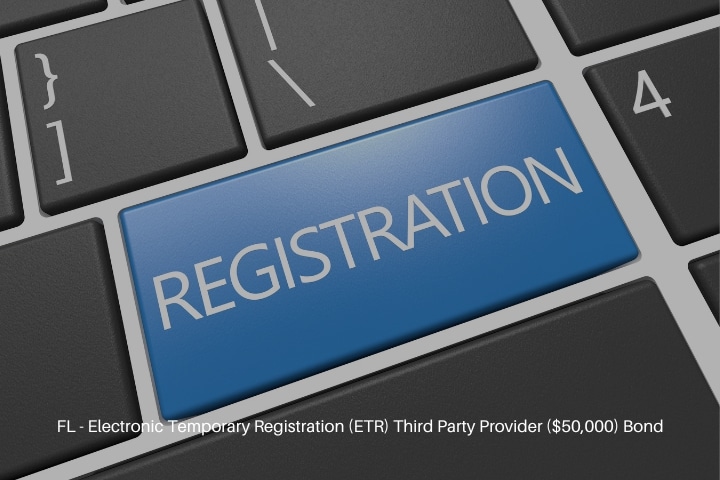
Get An Instant Quote on FL – Electronic Temporary Registration (ETR) Third Party Provider ($50,000) Bond Now
In the modern age of technology and convenience, electronic temporary registration (ETR) services have become essential for expediting vehicle registration processes in Florida. To ensure the reliability and integrity of these services, third-party providers are required to obtain an Electronic Temporary Registration Third Party Provider Bond. But what exactly does this bond entail, and why is it necessary for third-party providers in the Sunshine State?
Third-party providers of ETR services play a crucial role in facilitating the temporary registration of vehicles through electronic means. The Electronic Temporary Registration Third Party Provider Bond is a proactive measure implemented by the state to ensure that providers operate with integrity, professionalism, and adherence to industry regulations, thereby safeguarding the interests of consumers and maintaining the efficiency of vehicle registration processes.
When a third-party provider applies for authorization to offer ETR services in Florida, they are typically required to obtain an Electronic Temporary Registration Third Party Provider Bond as part of the regulatory process. The bond amount is determined by state regulations and must meet the minimum requirement set forth by the licensing authority.
If a bonded provider fails to fulfill their obligations, such as accurately processing temporary registrations or safeguarding consumer information, the state or affected parties can file a claim against the bond. If the claim is validated, the surety company that issued the bond will compensate the claimant up to the full amount of the bond, ensuring financial recourse for affected parties and the state.
The implementation of the FL Electronic Temporary Registration (ETR) Third Party Provider Bond carries several implications and benefits for both providers and consumers.
Firstly, it ensures that third-party providers operate with transparency, accuracy, and compliance with regulatory requirements, thereby promoting consumer confidence and trust in ETR services.
Secondly, the bond provides financial protection for consumers and the state in the event of non-compliance or fraudulent activities by bonded providers, ensuring that they are compensated for any financial losses incurred.
Furthermore, the bond helps maintain the efficiency and reliability of ETR services in Florida, thereby streamlining vehicle registration processes and enhancing overall service delivery.
In conclusion, the FL Electronic Temporary Registration (ETR) Third Party Provider ($50,000) Bond serves as a critical safeguard for consumers, the state, and third-party providers of ETR services. By ensuring compliance with regulations, promoting financial stability, and protecting the interests of consumers and the state, the bond contributes to the efficiency and reliability of vehicle registration processes in Florida. As ETR services continue to play a vital role in modernizing vehicle registration procedures, the Electronic Temporary Registration Third Party Provider Bond remains essential for upholding standards of integrity and professionalism in the industry.
The FL Electronic Temporary Registration (ETR) Third Party Provider ($50,000) Bond is a type of surety bond required by the state for companies or individuals acting as third-party providers of electronic temporary registration services for vehicles. This bond serves as a financial guarantee that the bonded provider will comply with all applicable laws, regulations, and industry standards pertaining to ETR services, while also providing financial protection for consumers and the state in case of non-compliance or fraudulent activities. But how does this bond function, and what responsibilities does it impose on bonded providers?

Third-party providers of ETR services may wonder about the extent of coverage provided by the bond in cases of technical failures or system errors. While the bond primarily serves to ensure compliance with regulations and protect consumers, there may be provisions for coverage of certain liabilities related to technical issues. Providers experiencing delays or inaccuracies due to technical failures should consult with legal advisors and the licensing authority to determine the extent of coverage provided by the bond and the process for filing claims in such situations.
Providers seeking to establish a track record of reliable service delivery may inquire about options for partial or phased release of the bond amount. While the bond amount is typically required upfront as part of the regulatory process, there may be provisions for releasing portions of the bond amount as providers demonstrate compliance with regulatory requirements and maintain a track record of reliable service delivery over time. Providers interested in exploring options for partial or phased release should consult with the licensing authority to determine the eligibility criteria and process for requesting such releases.
Providers undergoing changes in ownership or corporate structure may inquire about the transferability or assignability of the bond. While the bond is typically issued to a specific entity and may be non-transferable by default, there may be provisions for transferring or assigning the bond to another entity under certain circumstances, such as changes in ownership or corporate structure. Providers undergoing such changes should consult with the licensing authority and the surety company that issued the bond to determine the process and requirements for transferring or assigning the bond to the new entity.
Axcess Surety is the premier provider of surety bonds nationally. We work individuals and businesses across the country to provide the best surety bond programs at the best price.